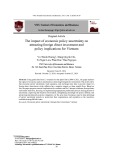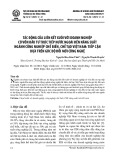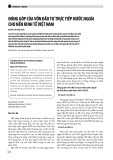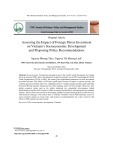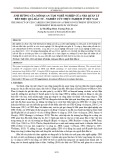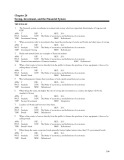
Số 333 tháng 3/2025 85
ĐÁNH GIÁ TÁC ĐỘNG CỦA ĐẦU TƯ TRỰC TIẾP
NƯỚC NGOÀI ĐẾN LƯỢNG KIỀU HỐI TẠI CÁC
NƯỚC CHÂU Á BẰNG MÔ HÌNH HỒI QUY PHÂN VỊ
Nguyễn Thị Hồng*
Trường đại học Ngoại Thương
Email: hongnt@ftu.edu.vn
Bùi Thu Trang
Trường Đại học Ngoại Thương
Email: trangbt.fgc@gmail.com
Nguyễn Thị Huyền Trang
Trường Đại học Ngoại Thương
Email: trang124nguyen@gmail.com
Mã bài báo: JED-1999
Ngày nhận: 16/09/2024
Ngày nhận bản sửa: 13/01/2025
Ngày duyệt đăng: 10/03/2025
Mã DOI: 10.33301/JED.VI.1999
Tóm tắt
Nghiên cứu này sử dụng phương pháp hồi quy phân vị để xem xét tác động của vốn đầu tư trực tiếp
nước ngoài (FDI) đến lượng kiều hối ở các phân vị khác nhau tại 47 nước châu Á trong giai đoạn
2010-2022. Bên cạnh FDI, bài viết còn xem xét tác động của một số biến vĩ mô khác đến lượng kiều
hối. Kết quả cho thấy ảnh hưởng FDI đến lượng kiều hối không đồng nhất mà phụ thuộc vào mức
độ của dòng kiều hối ban đầu của quốc gia. Cụ thể, FDI tác động tích cực đến lượng kiều hối ở mức
phân vị thấp, nhưng lại tác động tiêu cực ở các mức phân vị cao. Các yếu tố như GDP, tích lũy tài
sản gộp, nợ công đều có mối quan hệ thuận chiều với lượng kiều hối. Trong khi ổn định chính trị lại
có mối quan hệ ngược chiều, còn tỷ lệ thất nghiệp và tỷ lệ nghèo có mối quan hệ khá phức tạp. Từ
kết quả nghiên cứu, nhóm tác giả gợi ý một số biện pháp giúp các nước châu Á và Việt Nam tăng
thu hút nguồn lực từ kiều hối để phát triển kinh tế - xã hội.
Từ khóa: Châu Á, vốn đầu tư trực tiếp nước ngoài, hồi quy phân vị, kiều hối.
Mã JEL: F0, F24, F62, J61.
The impact of foreign direct investment on remittance inflows across Asian countries by
employing quantile regression model
Abstract
This study uses quantile regression methods to investigate the impact of foreign direct investment
(FDI) on remittance inflows across different quantiles for 47 Asian countries during the period
of 2010-2022. Besides FDI, the research also examines the impact of some macro variables on
remittances. The results reveal that the effect of FDI on remittances is heterogeneous and depends on
the initial level of remittance inflows in each country. Specifically, FDI exhibits a positive influence on
remittance flows at lower quantiles, while exerting a negative effect at higher quantiles. In addition,
determinants such as GDP, gross capital formation, and public debt display a positive correlation
with remittance inflows, whereas political stability has an inverse relationship. Unemployment
rates and poverty levels demonstrate complex relationship with remittance flows. Based on the
findings, several recommendations are proposed for Asian countries including Vietnam, to enhance
remittance inflows to support socio-economic development.
Keywords: Asia, foreign direct investment, quantile regression, remittances.
JEL codes: F0, F24, F62, J61.

Số 333 tháng 3/2025 86
1. Giới thiệu
Trong bối cảnh hội nhập kinh tế quốc tế ngày càng sâu rộng, bên cạnh nguồn thu từ hoạt động xuất khẩu
hàng hóa, dịch vụ và dòng vốn đầu tư nước ngoài, kiều hối đã trở thành một nguồn lực tài chính quan trọng
thúc đẩy tăng trưởng kinh tế (TTKT), hỗ trợ giảm nghèo và cải thiện đời sống của hàng triệu người dân các
nước, đặc biệt là các nước đang phát triển (Yoshino & cộng sự, 2019). Tại khu vực châu Á, năm 2023, kiều
hối chiếm tới 38,42% GDP của Tajikistan; 35,51% GDP của Lebanon; 26,89% GDP của Nepal; 20,52%
GDP của Yemen và 18,59% GDP của Kyrgyzstan (World Bank, 2024).
Với vai trò quan trọng như trên của kiều hối, đã có nhiều nghiên cứu chỉ ra các nhân tố ảnh hưởng đến
lượng kiều hối của một quốc gia như: FDI, GDP, thất nghiệp, nghèo đói, ổn định chính trị… Tuy nhiên, chưa
có công trình nào sử dụng phương pháp hồi quy phân vị để xem xét tác động trực tiếp của FDI đến lượng
kiều hối của các nước châu Á. Trong khi, khu vực này đang chứng kiến sự gia tăng FDI mạnh mẽ nhờ tiềm
năng phát triển kinh tế, dân số đông và môi trường đầu tư ngày càng cải thiện. Hơn nữa, sự phức tạp trong
mối quan hệ giữa FDI và kiều hối, cũng như sự góp mặt của các yếu tố kiểm soát khác có thể làm biến đổi
mối quan hệ giữa hai yếu tố này.
Vì vậy, bài viết này sẽ sử dụng phương pháp hồi quy phân vị nhằm phân tích tác động của FDI và một số
yếu tố khác đến lượng kiều hối tại 47 nước châu Á trong giai đoạn 2010-2022. Phương pháp này cho phép
phân chia mẫu dữ liệu thành các nhóm nhỏ dựa trên lượng kiều hối, từ đó giúp xác định tác động của FDI
đến lượng kiều hối ở các nước với lượng kiều hối khác nhau. Trên cơ sở kết quả nghiên cứu, nhóm tác giả
gợi ý một số biện pháp giúp các quốc gia châu Á nói chung và Việt Nam nói riêng tăng thu hút nguồn lực từ
kiều hối để phát triển kinh tế - xã hội.
2. Tổng quan nghiên cứu
Đã có nhiều nghiên cứu về các yếu tố ảnh hưởng đến dòng kiều hối của một quốc gia, trong đó có thể liệt
kê một số yếu tố tiêu biểu như:
2.1. Vốn FDI
Coon & Neumann (2017) khi nghiên cứu về ảnh hưởng của dòng FDI vào trong nước tới lượng kiều hối
chuyển về ở 118 nước, giai đoạn 1980-2010, đã kết luận rằng FDI có ảnh hưởng tích cực đến dòng kiều hối.
Cụ thể, ở mức ý nghĩa 1%, 10% tăng lên của dòng vốn FDI sẽ dẫn tới 3,6% tăng lên trong lượng kiều hối.
Trái lại, nghiên cứu của Yoshino & cộng sự (2019) về các yếu tố ảnh hưởng tới lượng kiều hối của 12
nước có thu nhập thấp và trung bình ở châu Á và Thái Bình Dương trong thời gian 2002-2015 đã khẳng định
FDI có mối quan hệ ngược chiều với dòng kiều hối nhận được. Tương tự, nghiên cứu của Tsaurai & Maseko
(2020) cũng chỉ ra tác động ngược chiều của dòng vốn FDI lên dòng kiều hối của các nền kinh tế chuyển đổi
trong giai đoạn 1997-2014. Nguyễn Hữu Hiếu (2020) đã phân tích tác động của FDI và thương mại quốc tế
lên TTKT của Việt Nam trong giai đoạn 2000-2018. Kết quả cho thấy, nhờ FDI tăng, nền kinh tế có thể phát
triển tốt hơn, tạo ra việc làm và tăng thu nhập, từ đó cải thiện mức sống và giảm bớt hoạt động gửi kiều hối
về từ người lao động ở nước ngoài. Đây là một trong những lý do giải thích cho sự suy giảm của dòng kiều
hối khi nền kinh tế phát triển.
2.2. Quy mô GDP
De & cộng sự (2019) xem xét sự biến đổi của kiều hối trong chu kỳ kinh doanh ở 109 nước trong giai đoạn
1980-2012 đã kết luận rằng, nếu động lực để gửi kiều hối về là lòng vị tha, lượng kiều hối chuyển về giúp
đỡ gia đình sẽ tăng lên khi nền kinh tế tiếp nhận bị suy thoái và ngược lại. Các tác giả cho rằng động cơ vị
tha được thúc đẩy bởi tình yêu thương và sự quan tâm đến việc cải thiện mức sống của người thân. Người
lao động ở nước ngoài sẽ cảm thấy yên tâm hơn khi những người thân ở quê nhà có thể cải thiện mức sống
nhờ vào lượng kiều hối họ gửi về.
Tác động ngược chiều của GDP trong nước tới lượng kiều hối được củng cố bởi công trình của Tsaurai
& Maseko (2020). Họ đã nghiên cứu về các yếu tố ảnh hưởng đến lượng kiều hối trên phạm vi 20 nền kinh
tế chuyển đổi, trong giai đoạn 1997-2014. Kết quả chỉ ra là các yếu tố kinh tế như FDI, TTKT, phát triển tài
chính và tiết kiệm có tác động mạnh tới kiều hối nhận được ở các nền kinh tế này. Trong đó, TTKT tác động
tiêu cực tới lượng kiều hối nhận được.
Ngược lại, công trình của Jijin & cộng sự (2022) lại cho thấy GDP và lượng kiều hối có quan hệ cùng

Số 333 tháng 3/2025 87
chiều. Sử dụng mô hình tự phân phối độ trễ hồi quy (ARDL) để đánh giá mối quan hệ ngắn hạn và dài hạn
giữa kiều hối nhận được của Ấn Độ trong thời gian 1991-2019 và các biến kinh tế vĩ mô, các tác giả kết luận
tỷ giá hối đoái, giá dầu và GDP đều tác động đáng kể đến dòng kiều hối. Trong đó, ở mức ý nghĩa 1%, nếu
GDP tăng 1% sẽ làm lượng kiều hối tăng 1,5%.
2.3. Tích lũy tài sản gộp
Tích lũy tài sản gộp bao gồm các khoản chi đầu tư trong nước cho tài sản cố định của nền kinh tế cộng với
biến động ròng của tài sản lưu động (World Bank - WB, 2016). Đến nay, có rất ít công trình xem xét tác động
trực tiếp của tích lũy tài sản gộp lên dòng kiều hối. Nghiên cứu của Chami & cộng sự (2003) nhấn mạnh tích
lũy tài sản gộp đóng vai trò quan trọng trong việc duy trì ổn định kinh tế vĩ mô, từ đó, tác động gián tiếp của
tích lũy tài sản gộp đến lượng kiều hối xảy ra là do nó tạo ra môi trường kinh doanh hấp dẫn hơn đối với
các nhà đầu tư. Bởi khi nền kinh tế ổn định, rủi ro đầu tư thấp, các nhà đầu tư (trong đó có kiều bào) sẽ lạc
quan hơn nên rót vốn vào các dự án kinh doanh trong nước, kết quả là lượng kiều hối chuyển về tăng lên.
Quadri (2019) đã chỉ ra rằng tích lũy tài sản gộp có tác động tích cực tới lượng kiều hối thông qua đầu
tư và TTKT. Tích lũy tài sản gộp (tức đầu tư) tăng góp phần hiện đại hóa cơ sở hạ tầng, thúc đẩy nền kinh
tế phát triển, kiều bào lạc quan hơn vào tương lai của nước nhà nên gửi kiều hối về nước. Tương tự, nghiên
cứu của Cristian & cộng sự (2012) cũng chỉ ra rằng khi thấy quê hương ngày càng phát triển, cơ sở hạ tầng
được cải thiện, và môi trường kinh doanh trở nên minh bạch, kiều bào tin tưởng rằng việc gửi tiền về để đầu
tư sẽ mang lại nhiều lợi ích.
2.4. Nợ công
Tuy chưa có nghiên cứu nào xem xét tác động trực tiếp của nợ công đến lượng kiều hối, song có thể phân
tích cơ chế tác động của nợ công đến TTKT, tỷ giá hối đoái và qua đó là lượng kiều hối. Khi nợ công lớn, áp
lực trả nợ cao, chính phủ buộc phải dành một phần đáng kể ngân sách để trả gốc và lãi, dẫn đến cắt giảm chi
tiêu cho các lĩnh vực khác, bao gồm cả đầu tư công. Hậu quả là đầu tư và TTKT suy giảm. Nghiên cứu của
Baum & cộng sự (2013) dựa trên số liệu quan sát của khu vực châu Âu từ 1999 đến 2011 cho thấy cứ 1%
tăng thêm trong nợ công sẽ làm giảm tốc độ TTKT trung bình là 0,02%. Tương tự, nghiên cứu của Alesina
& Passalacqua (2015) kết luận tỷ lệ nợ công/GDP cao hơn 100% có thể làm giảm tốc độ TTKT thêm 0,5%
mỗi năm.
Bên cạnh đó, do áp lực trả nợ lớn, tỷ giá hối đoái sẽ bị biến động mạnh. Ngoài ra, nợ công tăng cao, rủi
ro vỡ nợ hoặc khủng hoảng nợ công có nguy cơ xảy ra, gây bất ổn kinh tế và làm gia tăng lạm phát. Dẫn
chứng từ khủng hoảng nợ công Châu Âu với ảnh hưởng nặng nề nhất là ở Hy Lạp, đã khiến cho giá trị của
đồng tiền chung Châu Âu liên tục trượt giá so với các đồng tiền khác, nền tài chính của các quốc gia suy yếu
(Vũ Minh Long, 2013). Trong môi trường kinh tế bất ổn như vậy, người dân có xu hướng gửi tiền tiết kiệm
ở nước ngoài thay vì chuyển tiền về nước để bảo toàn giá trị tài sản hoặc tìm kiếm cơ hội đầu tư tốt hơn ở
nơi khác. Hậu quả là dòng kiều hối về nước giảm.
2.5. Tỷ lệ thất nghiệp
Khi nghiên cứu về ảnh hưởng của tỷ lệ thất nghiệp đến lượng kiều hối ở 100 nước trong giai đoạn 1975-
2002, Ruiz-Arranz (2009) nhấn mạnh khi thất nghiệp trong nước gia tăng, thu nhập và khả năng tài chính
của những người thân ở quê nhà bị ảnh hưởng. Lúc này, những người lao động ở nước ngoài sẽ gửi tiền về
giúp đỡ gia đình, bù đắp phần thu nhập bị mất đó.
Mustafa & Rashid Ali (2018) phân tích mối quan hệ giữa kiều hối và các biến số vĩ mô của Pakistan trong
giai đoạn 2002-2013 bằng mô hình trọng lực đã kết luận rằng mối quan hệ giữa tình trạng thất nghiệp và
lượng kiều hối là thuận chiều và không đáng kể mà nguyên nhân là do sự thay đổi cơ cấu kinh tế. Sự chuyển
đổi sang các ngành sản xuất hiện đại hơn đã làm giảm nhu cầu lao động, người lao động bị thất nghiệp. Khi
cơ hội việc làm trong nước hạn hẹp, người dân di chuyển sang các quốc gia khác. Làm việc ở nước ngoài
không chỉ mang lại thu nhập cao hơn mà còn giúp họ gửi nhiều tiền hơn về gia đình. Bên cạnh đó, các yếu
tố như sự mất giá của đồng rupee Pakistan và sự gia tăng kỹ năng của người lao động cũng góp phần đáng
kể vào sự tăng trưởng của kiều hối.
2.6. Tỷ lệ nghèo
Mối quan hệ cùng chiều giữa tỷ lệ nghèo và lượng kiều hối khá nhất quán trong các nghiên cứu. Azizi

Số 333 tháng 3/2025 88
(2021) khi phân tích dữ liệu từ 103 nước đang phát triển trong thời gian 1990-2014 và đã khẳng định rằng
khi mức độ nghèo đói tăng lên, nhiều người di cư tới vùng hoặc nước khác để có thể hỗ trợ gia đình của họ
ở quê nhà nên lượng kiều hối có xu hướng tăng.
Tương tự, Allen (2021) cũng nhận thấy những quốc gia Châu Phi thuộc sa mạc Sahara có tỷ lệ nghèo cao
hơn thường nhận được nhiều kiều hối hơn, vì các gia đình nghèo phụ thuộc nhiều hơn vào tiền gửi từ các
thành viên gia đình làm việc ở nước ngoài. Nghiên cứu còn nhấn mạnh rằng kiều hối là nguồn lực then chốt
trong việc giảm nghèo và bất bình đẳng thu nhập ở các nước này.
2.7. Mức độ ổn định chính trị
Nghiên cứu về tác động của ổn định chính trị lên lượng kiều hối chảy vào 38 nước Châu Phi cận Sahara
giai đoạn 200-2009 bằng phương pháp GMM, Adenutsi & Ahortor (2021) đã chỉ ra rằng độ chênh lệch của
thu nhập, lãi suất, tỷ giá hối đoái và chất lượng thể chế là những nhân tố chính quyết định lượng kiều hối. Từ
đó, hai tác giả đề xuất chính phủ các nước nên giữ nền chính trị ổn định để thu hút lượng kiều hối nhiều hơn.
Sử dụng mô hình hiệu chỉnh sai số ECM, Akanbi & Yusuf (2024) xem xét tác động của chất lượng quản
trị lên kiều hối ở Nigeria cũng chỉ ra mối quan hệ cùng chiều giữa mức độ ổn định chính trị và lượng kiều
hối. Họ cho rằng chính trị càng ổn định thì lượng kiều hối quốc gia nhận được càng nhiều.
3. Mô hình và phương pháp nghiên cứu
3.1. Mô hình nghiên cứu
Mẫu nghiên cứu của bài viết là 47 quốc gia độc lập ở châu Á. Việc lựa chọn các quốc gia này dựa trên
tính khả dụng của dữ liệu đáng tin cậy về FDI, lượng kiều hối và các yếu tố kinh tế vĩ mô khác. Trong số
48 quốc gia độc lập tại châu Á, nghiên cứu loại trừ Bắc Triều Tiên do không có dữ liệu đầy đủ và đáng tin
cậy trong khoảng thời gian nghiên cứu. Ngoài ra, các vùng lãnh thổ phụ thuộc hoặc có chủ quyền đặc biệt
như Hồng Kông, Đài Loan và Palestine cũng không được đưa vào phân tích nhằm đảm bảo tính đồng nhất
trong mẫu nghiên cứu.
Dựa trên nghiên cứu của Chami & cộng sự (2003), Ruiz-Arranz (2009), Cristian & cộng sự (2012), Baum
& cộng sự (2013), Coon & Neumann (2017), Yoshino & cộng sự (2019), De & cộng sự (2019), Azizi (2021),
Adenutsi & Ahortor (2021), nhóm tác giả thiết lập mô hình nghiên cứu xem xét tác động của FDI đến lượng
kiều hối tại 47 nước châu Á trong giai đoạn 2010-2022 như sau:
lnRemit = β0 + β1lnFDI + β2lnGDP + β3Capital + β4Debt + β5Unemt + β6Poverty + β7Stab + εit
Trong đó:
lnRemit: Logarit tự nhiên của lượng kiều hối chuyển về nước bao gồm tất cả các khoản tiền (USD) người
lao động ở nước ngoài gửi về nước,
β0: hệ số chặn của mô hình hồi quy,
β1 - β7: hệ số hồi quy tương ứng với các biến,
lnFDI: Logarit tự nhiên của FDI nhận vào (USD),
lnGDP: Logarit tự nhiên của GDP (USD) của nước nhận kiều hối,
Capital: Tích lũy tài sản gộp, bao gồm các khoản chi đầu tư trong nước cho tài sản cố định của nền kinh
tế cộng với biến động ròng của tài sản lưu động (%GDP),
Debt: Nợ công, là tổng số tiền vay từ cả trong nước và nước ngoài của chính quyền các cấp để bù đắp
thiếu hụt ngân sách (%GDP),
Unemt: Tỷ lệ thất nghiệp (%),
Poverty: Tỷ lệ nghèo, tỷ lệ phần trăm của dân số có thu nhập thấp hơn ngưỡng nghèo (thu nhập dưới 2,15
USD/ngày, PPP năm 2017 của WB (2017)),
Stab: Ổn định chính trị, thước đo nhận thức về khả năng xảy ra bất ổn chính trị và/hoặc bạo lực chính trị.
Thước đo này trong khoảng từ 0 (bất ổn chính trị cao nhất) đến 100 (ổn định chính trị cao nhất).
εit: Sai số của nước i trong năm t, thể hiện sức ảnh hưởng của các yếu tố ngoài mô hình tới biến phụ thuộc.
Dựa trên kết quả của một số nghiên cứu, nhóm tác giả tổng hợp dấu kỳ vọng và nguồn của các biến số
như ở Bảng 1.

Số 333 tháng 3/2025 89
3.2. Phương pháp nghiên cứu
Trước hết, với dữ liệu dạng bảng được sử dụng trong nghiên cứu, nhóm tác giả sử dụng phương pháp ước
lượng phổ biến là hồi quy tuyến tính OLS, tác động cố định (FEM), tác động ngẫu nhiên (REM). Sau khi
lựa chọn được phương pháp phù hợp, nhóm tác giả tiến hành kiểm định các khuyết tật của mô hình như hiện
tượng đa cộng tuyến, phương sai sai số thay đổi, tự tương quan.
Nếu mô hình gặp phải khuyết tật đa cộng tuyến, biến số có hệ số VIF > 10 sẽ được loại bỏ. Bên cạnh đó,
nếu mô hình gặp phải hiện tượng phương sai sai số thay đổi hoặc tự tương quan, phương pháp hồi quy bình
phương nhỏ nhất khái quát hóa (GLS) sẽ được sử dụng để khắc phục các khuyết tật. Cuối cùng, để phân tích
kỹ hơn tác động của các yếu tố tới các mức kiều hối khác nhau, nhóm tác giả sử dụng mô hình hồi quy phân
vị 3 mức (25, 50 và 75) bằng cách sắp xếp 47 nước châu Á theo lượng kiều hối tăng dần.
4. Kết quả nghiên cứu và thảo luận
4.1. Kết quả ước lượng
Đầu tiên, phương pháp hồi quy OLS được tiến hành để có kết quả ban đầu của hàm hồi quy. Tiếp theo,
nhóm tác giả tiến hành hồi quy mô hình FEM. Hệ số prob>chi2 = 0,00 < 0,05 nên mô hình FEM phù hợp
hơn mô hình OLS. Sau đó, kiểm định Breusch–Pagan Lagrangian được tiến hành để so sánh giữa mô hình
REM và OLS. Kết quả chỉ ra mô hình OLS phù hợp hơn. Như vậy, trong 3 mô hình, FEM là phù hợp nhất
(Bảng 2).
Bảng 1: Dấu kỳ vọng và nguồn của các biến số
Biến số Dấu kỳ vọng Nguồn dữ liệu
lnRemit
lnFDI +
/
- WDI
lnGDP + WDI
Capital + WDI
Deb
t
- WDI
Unem + WDI
Poverty + WDI, Báo cáo của các n
ư
ớc
Stab + WDI
Ngu
ồn: Tổng hợp của nhóm tác giả.
3.2. Phương pháp nghiên cứu
Trước hết, với dữ liệu dạng bảng được sử dụng trong nghiên cứu, nhóm tác giả sử dụng phương pháp ước lượng
phổ biến là hồi quy tuyến tính OLS, tác động cố định (FEM), tác động ngẫu nhiên (REM). Sau khi lựa chọn được
phương pháp phù hợp, nhóm tác giả tiến hành kiểm định các khuyết tật của mô hình như hiện tượng đa cộng
tuyến, phương sai sai số thay đổi, tự tương quan.
Nếu mô hình gặp phải khuyết tật đa cộng tuyến, biến số có hệ số VIF > 10 sẽ được loại bỏ. Bên cạnh đó, nếu mô
hình gặp phải hiện tượng phương sai sai số thay đổi hoặc tự tương quan, phương pháp hồi quy bình phương nhỏ
nhất khái quát hóa (GLS) sẽ được sử dụng để khắc phục các khuyết tật. Cuối cùng, để phân tích kỹ hơn tác động
của các yếu tố tới các mức kiều hối khác nhau, nhóm tác giả sử dụng mô hình hồi quy phân vị 3 mức (25, 50 và
75) bằng cách sắp xếp 47 nước châu Á theo lượng kiều hối tăng dần.
4. Kết quả nghiên cứu và thảo luận
4.1. Kết quả ước lượng
Đầu tiên, phương pháp hồi quy OLS được tiến hành để có kết quả ban đầu của hàm hồi quy. Tiếp theo, nhóm tác
giả tiến hành hồi quy mô hình FEM. Hệ số prob>chi2 = 0,00 < 0,05 nên mô hình FEM phù hợp hơn mô hình OLS.
Sau đó, kiểm định Breusch–Pagan Lagrangian được tiến hành để so sánh giữa mô hình REM và OLS. Kết quả chỉ
ra mô hình OLS phù hợp hơn. Như vậy, trong 3 mô hình, FEM là phù hợp nhất (Bảng 2).
Bảng 2: Kết quả hồi quy
k OLS FEM REM
lnFDI 0,008 -0,013 -0,012
lnGDP 0,452*** 0,926*** 0,836***
Capital 0,033*** 0,005 0,005
Deb
t
0,011*** 0,003*** 0,003***
Unem 0,034** -0,017 -0,007
Poverty 0,010** -0,001 -0,001
Bảng 2: Kết quả hồi quy
k OLS FEM REM
lnFDI 0,008 -0,013 -0,012
lnGDP 0,452*** 0,926*** 0,836***
Capital 0,033*** 0,005 0,005
Deb
t
0,011*** 0,003*** 0,003***
Unem 0,034** -0,017 -0,007
Poverty 0,010** -0,001 -0,001
Stab -0,039*** 0,003 0,001
H
ằ
ng s
ố
15,585*** 10,422*** 11,256***
Ghi chú: *** p < 0,01, ** p < 0,05, * p < 0,1
Nguồn: Tính toán của nhóm tác giả.
Sau khi chọn được phương pháp phù hợp, các kiểm định VIF, Breusch-Pagan và Wooldridge cho các khuyết tật
của mô hình được tiến hành. Kết quả cho thấy mô hình gặp phải khuyết tật phương sai sai số thay đổi. Do vậy,
nhóm tác giả tiến hành phương pháp hồi quy GLS để khắc phục khuyết tật trên. Kết quả được thể hiện ở cột (1)
trong Bảng 3. Có thể thấy, ngoại trừ hệ số của biến tỷ lệ thất nghiệp và tỷ lệ nghèo không có ý nghĩa thống kê,
các biến độc lập còn lại đều có tác động tới biến phụ thuộc ở mức ý nghĩa 1% hoặc 5%. Đặc biệt, GDP tác động
mạnh nhất lên lượng kiều hối, khi GDP tăng 1%, các yếu tố khác không thay đổi, lượng kiều hối chuyển về nước
sẽ tăng 0,475%. Theo sau đó, khi lượng FDI đổ vào trong nước tăng 1%, các yếu tố khác không đổi, thì lượng
kiều hối sẽ giảm 0,065%.
Để xác định tác động của FDI đến lượng kiều hối ở các nước với lượng kiều hối khác nhau, phương pháp hồi quy
phân vị được sử dụng. Trong đó, phân vị 25, 50 và 75 lần lượt cho biết 25%, 50% và 75% dữ liệu phản ánh nước
có lượng kiều hối thấp nhất. Nói cách khác, từ mức phân vị 25, lên đến 50 và 75, lượng kiều hối của các nước sẽ
tăng dần. Cột (2), (3) và (4) của Bảng 3 thể hiện các kết quả hồi quy phân vị.
Bảng 3: Kết quả hồi quy phân vị
(1)
GLS
(2)
Phân vị 25
(3)
Phân vị 50
(4)
Phân vị 75
lnFDI -0,065**
(0,030)
0,174*
(0,090)
-0,011*
(0,064)
-0,135***
(0,042)
lnGDP 0,475***
(0,030)
0,317***
(0,090)
0,503***
(0,064)
0,572***
(0,042)
Capital 0,020***
(0,005)
0,049**
(0,016)
0,018
(0,011)
0,023**
(0,007)


